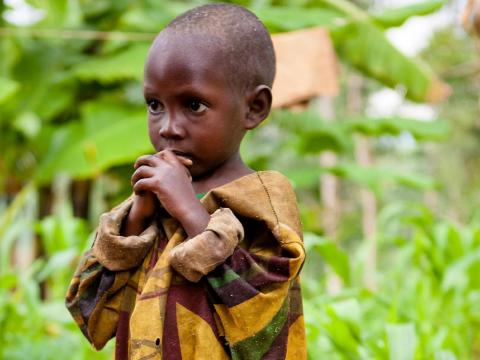A Child left alone

Cedric's mother left him with his aunt when he was eight months old. Without his mother’s breast milk, Cedric lacked essential nutrients at a critical stage of his development. “He’s not in a good condition,” Philimina says. Cedric suffers from stunted growth, which results from chronic malnutrition before a child is two years old.
Thump. Thump. Standing at a distance, Cedric can hear the sound of his cousins’ bare feet pounding the dirt path outside their rural home. An energetic game, similar to hopscotch, has just begun. Wearing an over-sized shirt that reaches past his knees, Cedric looks on as he pulls his arms inside his sleeves for comfort. Cedric stays for a little while, and then moves away from the crowd.
“I don’t like playing,” says the eight-year-old who lives in central Burundi.
His aunt, Philimina Nduwayezu, agrees. “He’s never happy,” she explains. “He never plays with others. He is always depressed.”
Cedric lives with his aunt and five cousins in Mushikamo Area Development Programme (ADP), a new area where World Vision has begun long-term development work in central Burundi. When Cedric’s mother was seven months pregnant with him, she moved in with Philimina and her children.
“She was sent away by our parents when she was pregnant,” Philimina says of her younger sister who was not married at the time. Years earlier, Philimina had experienced the same rejection from their parents when she became pregnant for the second time. Empathising with her sister, Philimina accepted her into her home. “She gave birth when she was here with me.”
Together, the two single mothers struggled to support their young children. With only a small plot of land to grow maize and bananas, they worked for local farmers to make ends meet. But Cedric’s mother soon became weary of the pressures in her life. While Cedric was sleeping one day, she quietly slipped out of the house and abandoned her eight-month-old son.
“It was market day, so I thought she was going there,” Philimina remembers. “But she never came back.”
With his mother gone, and having no connection to his father, Cedric became an orphan before his first birthday.
“When Cedric’s mother left, I felt very bad,” Philimina says. “I thought, ‘What am I going to do with this child?’ I even wanted to drop him off, saying ‘Who can I give this child to?’ But when I saw there was nothing I could do, I just stayed with him.”
Although Philimina tried to care for nephew, she didn’t have the means to properly feed an infant. And without his mother’s breast milk, Cedric lacked essential nutrients at a critical stage of his development.
“He’s not in a good condition,” Philimina says. Cedric suffers from stunted growth, which results from chronic malnutrition before a child is two years old. After this point, the effects are often irreversible. Stunting can cause poor development, health and cognitive abilities throughout one’s lifetime.
Although Cedric is eight years old, he is about the same height as his five-year-old cousin, Marie. In Africa and Asia, stunted rates are particularly high. UNICEF reports that nearly 90 per cent of stunted children in developing countries live in these two regions.
Cedric still struggles to maintain a healthy diet today, but his aunt is not in a position to help him. “I don’t have enough food,” Philimina says. When she has money to buy maize flour, Philimina will make ugali, a traditional stiff porridge, and serve it with any cassava leaves she can find. On most days, the family can only afford to eat one meal.
Cedric is thinner and much weaker than his cousins living with him, although they are all eating the same meagre meals. At times, his aunt has to carry him because he is frequently sick and too weak to walk. “I was always carrying him on my back,” Philimina says. “That is one of the factors why Cedric does not go to school.”
The father of Philimina’s five children visits them regularly, but he doesn’t provide any food or money to care for their needs. “He comes once a week just to have sex with me,” says Philimina who is now pregnant with their sixth child together. “He won’t even spend a night here.”
Although he offers her no financial or emotional support, Philimina continues to accept him. She lost her first husband during Burundi’s civil war in 1993—after two years of marriage—and fears losing another loved one. “I just want to avoid looking for another man,” she says.
As the sole provider of her family, Philimina worries about how they will manage. But she is most concerned about Cedric. “I hope that he can grow up and go to town to take care of himself,” she says of her nephew. “I can’t keep taking care of him because I’m not even able to take care of my own children.”